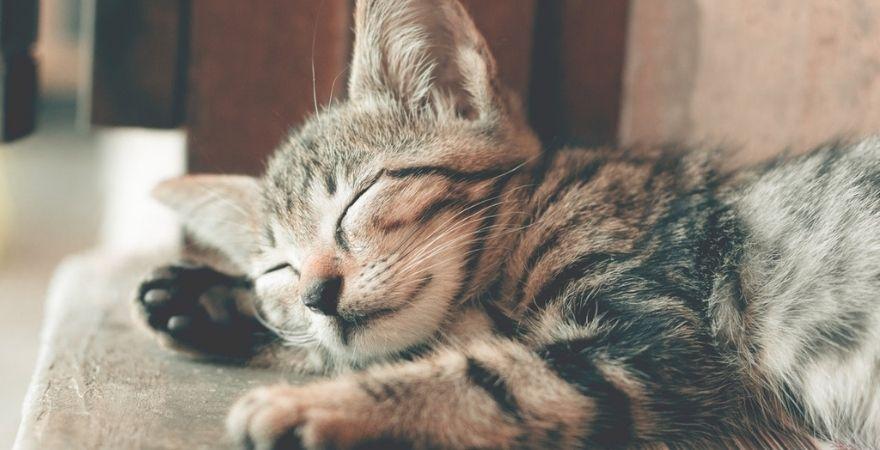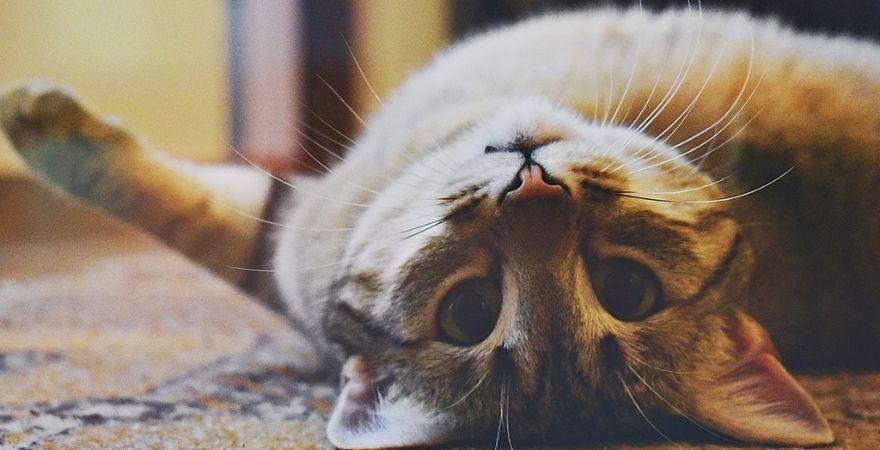a moment in time, a lifetime of love
Where’d the time go?! Just the other day you brought home a nameless little fuzz ball snuggled tight against you, both of you unsure about what’s going on (or what you’re doing — the joys of being a brand new pet parent!), but excited about the possibility of spending a lot of time together.
Then boom, you’re 10 years in. The cuddles, messes, and late night sessions all coalesced into a loving and (somewhat) more peaceful relationship. It’s a blessing to have as long and happy a relationship as you do with kitty, and their later years are part of the life journey that also comes with its own challenges.
One common problem you’ll need to be on the lookout for is hyperthyroidism.
Just like the name suggests, hyperthyroidism is a disease caused by the thyroid producing too many hormones, namely T3 and T4 — this over-production comes from an enlarged thyroid gland in the cat’s neck. The increase in gland size is caused by a non-cancerous tumour called an adenoma. In rare cases, some hyperthyroid diseases are caused by cancer-causing tumours called the thyroid adenocarcinomas.
No one knows the root cause of hyperthyroidism, but different factors can include not enough or too much of certain compounds in kitty’s diet, or thyroid disrupting chemicals in their food or environment. It’s not the most helpful explanation (if we had the answers we’d totally share them right here with you!), but it is a start knowing that hyperthyroidism seems to be something that comes with the territory of getting older.
Also important? Hyperthyroidism causes other problems in the body, because thyroid hormones affect nearly all of the organs in the body.

Photo by Tambako the Jaguar via Flickr.
Signs of Hyperthyroidism
Telltale signs of anything serious going on won’t show up right away, but does get more obvious as it gets worse. Clinically, the most common signs of hyperthyroidism are weight loss, a spike in appetite as well as thirst and going to the bathroom. Hyperthyroidism might also cause vomiting, diarrhea, and hyperactivity. If kitty’s coat also starts looking matted with a greasy feel, that’s definitely a sign to give your vet a call.
diagnosis
If your vet suspects kitty has hyperthyroidism, they’ll do a physical exam and feel kitty’s neck area for an enlarged thyroid gland. Kitty’s heart rate and blood pressure might get a once-over as well (#seniorlife). If your vet has a good hunch that it is hyperthyroidism, a blood test is in order and an analysis of thyroid hormone levels. Most cats with hyperthyroidism have higher levels of the hormone T4 in the bloodstream, but a small percentage can still have thyroid issues with a normal T4 level. Your vet will recommend more tests as needed, and will double check kitty’s heart and kidneys, since hyperthyroidism causes a host of other health problems in major organs.

Photo by Anne Worner via Flickr.
what now?
Hyperthyroidism sounds scary, and should be taken seriously, but it’s not a death sentence. With proper treatments at home - and sometimes at the vet, you and your old fuzz ball will continue having a long and loving relationship, with the odd late night session here and there.
If you can’t wait that long, you can check out the Scruffy Paws Thyroid Soothe Drops, made with all natural ingredients that come as a tasteless dropper, perfect for getting kitty on track to get better.

Photo by Tambako the Jaguar via Flickr.

Stephanie Pollard
Writer. Pet Enthusiast. Ambivert.




6 comments
I used these drops for my 15 year old ..she liked them .
But I feel I found them a little to late she had gone downhill before starting them. Thanks for a simple fix to keep her going an extended time . We did just say goodbye this month. Love your natural solutions ..Keep it up!
Hello, my cat had Hyperthyrodism. He began loosing weight, and had all the tests. He was 11 at the time. He was put on Synthroid for it, but about 2 weeks after being on it, he began scratching his ears all the time!! I got to the point he made them bleed!! We had to put a cone on him, but he would not stop. The Dr. said he would have to see a specialist. Thank goodness there is a place right near me, with every kind of Dr. you can think of! They had to give him radiation to “kill” most of they thyroid. He had to stay there for a week, we could not visit. Then he had to be in a bedroom for 3 weeks! The poor little guy. His name is Max, he looks a lot like the cat in the picture, but had more white going up his nose. We had to have flushable kitty litter for the solids, and had to wash the scoop off and our hands. He could not go near my other cats for the 3 weeks. Quite an ordeal, but he is find now, thank goodness no more ear scratching! I know how he feels, I have an underactive thyroid and take Synthroid too, and my ears itch!!! Thank goodness he has recovered, and his levels are now fine!!
Oh this is so sad. The sweet tiger striped kitty looks so much like my Tugger who Inlost to complications of this last year. He was such a love and my baby. When he was first diagnosed the vet spoke to me about radiation therapy which I decided to do. Tugger lived 5 years afterwards and one morning he was almost totally blind. I rushed him to the emergency vet and determined he had a tumor behind his eyes. His condition deteriorated so rapidly I had to let him go. That broke my heart and I’ve always wondered if radiation was the right path to take. I didn’t have any warning signs of the tumor until he cried in the night as that’s when the blindness took over. I’d love to understand more about this so please share your thoughts. My other kitty is taking your kidney treats and seems to be doing well. Thank you for caring.